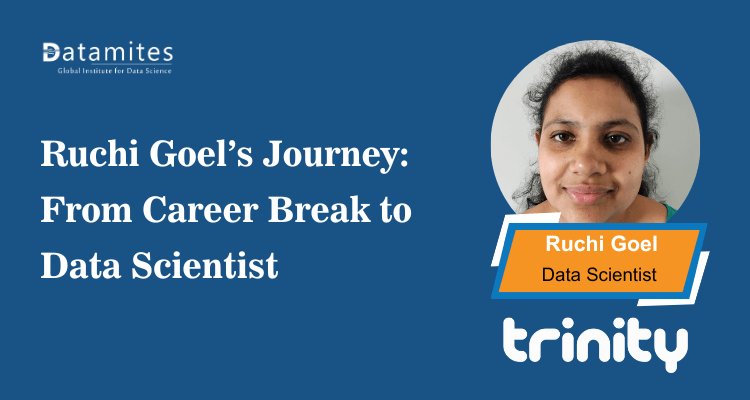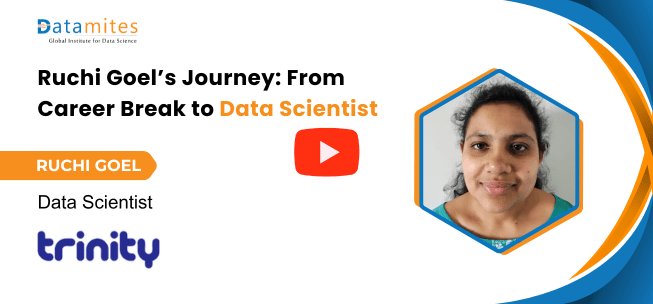Ruchi Goel’s Journey: From Career Break to Data Scientist
After a five-year career break, Ruchi Goel successfully transitioned into a data science role through determination, upskilling, and hands-on learning. Her journey highlights the power of consistency, foundational skills, and the right training support.

In today’s fast-evolving tech landscape, transitioning into a data science role can be both exciting and intimidating, especially for professionals returning after a career break. Ruchi Goel, a determined IT professional, re-entered the workforce after a five-year hiatus and successfully carved a new path in data science. Her story reflects the power of resilience, continuous learning, and staying committed to personal growth in a highly competitive domain.
If you’re exploring a career shift or restarting after a break, watch DataMites success stories to gain real-life insights and motivation. Ruchi’s journey is one among many that demonstrate how the right training, practical skills, and consistent effort can help you land a data science role.
Ruchi’s Successful Data Science Journey with DataMites Institute
Discover how Ruchi overcame a five-year career break to launch a growing career in data science with the support of DataMites.
Q1: Can you tell us a bit about yourself and your background?
I graduated in 2011 and initially worked with companies like TCS, Galaxy, and LG. In 2017, I took a career break. Last year, I decided to upskill and enrolled in a data science course at DataMites Institute. Recently, I secured a job in this field, and I’m really happy with how things have turned out.
Q2: How was your journey of transitioning into data science?
It was full of ups and downs. Initially, I struggled to grasp the concepts, but with consistent effort and the help of mentors and resources, I began to understand. The key was to get the basics right, especially in Python, statistics, and machine learning. Interviews focused more on fundamental understanding than deep theoretical knowledge.
Q3: What motivated you to choose data science as your new career path?
I’ve always been strong in mathematics and statistics. I was exploring options like automation testing, but data science stood out as a booming field with greater future potential. After researching and talking to friends, I decided to take the plunge.
Q4: What does a typical day look like for a data scientist?
It starts with understanding the concepts behind models and algorithms, why they work, and how to apply them. Coding is also part of the job, but companies expect you to be efficient rather than perfect. Hands-on practice is crucial, and writing code instead of copy-pasting helps build confidence.
Q5: Which tools and technologies do you use in your role?
I primarily use Python and Power BI. For modeling, I work with machine learning algorithms. I also have prior experience in SQL, which continues to be useful in data querying tasks.
Q6: What core skills should someone entering data science focus on?
Strong basics in mathematics and statistics are essential. You don’t need advanced math, but foundational understanding is non-negotiable. Coding in Python, especially list comprehensions and lambda functions, is important. Also, having a basic understanding of tools like Power BI and emerging areas like generative AI and deep learning is helpful.
Q7: What are common topics or questions in interviews today, especially around generative AI?
Companies are increasingly asking about LLMs, CNNs, RNNs, and NLP. They want to know whether you understand how chatbots work, not necessarily build one from scratch. The focus is more on conceptual understanding and practical implementation.
Q8: How important is domain knowledge in data science?
Extremely important. If you don’t understand the use case or domain, you may ignore crucial data features. For example, attributes with missing values might still be important to the client. Reading documentation and understanding the project requirements is key, especially in sensitive domains like healthcare and finance.
Q9: How much daily study time do you recommend for learners?
Even 30 minutes to an hour daily is enough if you’re consistent. Coding every day, even just one small program, makes a big difference when it comes time to face interviews. Regular practice helps reduce anxiety and improves retention.
Q10: What personal challenges did you face while making this career transition?
As a mother, time management was a major challenge. But I was motivated and interested in the subject. Reading official documentation before using any tool helped me understand things better and faster.
Q11: What are the top 3 must-have skills to crack data science interviews?
- Python – for coding and data manipulation.
- Machine Learning – understanding different models and when to use them.
- Visualization Tools – such as Power BI and even Excel. Companies expect you to present insights clearly.
Q12: What common mistakes should beginners avoid?
Many people underestimate the complexity of real-world data science. Also, skipping regular practice, especially in coding, can make you unprepared for even simple tasks like merging DataFrames. Consistency and resilience are key, especially after rejections.
Q13: What’s your vision for the next 5–10 years?
I want to keep learning and growing. Since I’ve re-entered the workforce after a break, I’m aiming to build deep expertise in my domain so I can contribute confidently and stay ahead in the industry.
Q14: How can students build a strong data science portfolio?
Customise your resume based on each job description. Include relevant tools and skills that match the employer’s needs. Make sure you fully understand your project work, especially capstone or internship projects, since interviewers often ask detailed questions about them.
Q15: Final thoughts on AI replacing jobs?
I don’t believe AI will replace everyone. Technologies evolve, and we need to evolve with them. Staying updated and improving your skill set is the only way to remain relevant in the industry.
Refer to these articles:
- From Commerce to Data Scientist: Arif’s Success Story
- Rinu’s Journey: From Electrical Engineer to Data Scientist
- How Saurabh Switched to a Data Science Career
Insights from Ruchi's Transformation into a Data Scientist
Discover how Ruchi overcame a career break and transitioned into data science with the help of DataMites.
- Ruchi re-entered the workforce after a 5-year career break and successfully transitioned into data science.
- Basics in Python, statistics, and machine learning are crucial for understanding core concepts and clearing interviews.
- Just 30 minutes to 1 hour of daily focused study and coding practice can be highly effective if done consistently.
- A strong base in math and statistics can ease the learning curve in data science.
- Writing code manually (not copy-pasting) builds better understanding, confidence, and recall during interviews.
- Interviewers care more about problem-solving and conceptual understanding than perfect coding syntax.
- Be prepared to explain every part of your projects (especially internship and capstone projects) in detail.
- Interview questions are evolving, with a growing focus on LLMs, CNNs, RNNs, and NLP applications.
- Understanding the industry (healthcare, finance, etc.) is critical to building relevant and effective data science solutions.
- Python, Power BI, SQL, and basic Excel are frequently used and expected by employers.
- Tailor your resume and preparation according to the job description (JD) to align with employer expectations.
- Python (coding), machine learning (model selection & evaluation), and data visualization (Power BI, Excel).
- Underestimating complexity, irregular practice, and ignoring foundational skills can stall progress.
- Especially for working parents or career returners, effective time utilization is essential for success.
- Staying current with technology trends and continually upgrading skills is key to long-term career relevance.
Refer to these articles:
- Data Science course fee in Delhi
- Why Data Scientist Career in Delhi
- How to become a Data Scientist in Delhi
Ruchi Goel’s journey is a compelling example of how determination, structured learning, and daily practice can lead to success, even after a career break. Despite the challenges of returning to the workforce, she carved a path into data science by focusing on consistent upskilling and real-world application of her knowledge. Her transition underscores that career gaps are not roadblocks when met with the right mindset and approach.
As data science is among the top IT courses in demand today, Ruchi’s journey resonates with both aspiring data scientists and professionals shifting into tech. Her story highlights the value of a strong foundation and the power of hands-on practice. For anyone pursuing data science, consistency and a learning mindset are key to unlocking exciting opportunities in this growing field.
If you’re inspired by Ruchi Goel’s journey into data science after a career break, now is the perfect time to upskill and make your move. According to the IMARC Group, the global data science market is projected to grow from USD 15.2 billion in 2024 to USD 144.9 billion by 2033, at a CAGR of 27.08%. With businesses generating enormous volumes of digital data, the demand for skilled data professionals is soaring. Enrolling in a top-tier training program that offers hands-on learning, real-time projects, and placement support can be a game-changer, especially when you choose a trusted data science institute in Delhi, Bangalore, Hyderabad, Chennai, Mumbai, Pune, Ahmedabad, or Coimbatore.
If you're thinking about switching to a career in data science, DataMites Institute is a trusted training institute that offers comprehensive programs in data science, AI, ML, Python, and data analytics. With globally recognized certifications from IABAC and NASSCOM FutureSkills, DataMites equips learners with practical exposure, expert mentorship, and job assistance to confidently step into the tech industry. The institute makes data science education accessible and career-focused, offering data science courses in Delhi, Pune, Bangalore, Hyderabad, Chennai, Ahmedabad, Coimbatore, and Mumbai.

